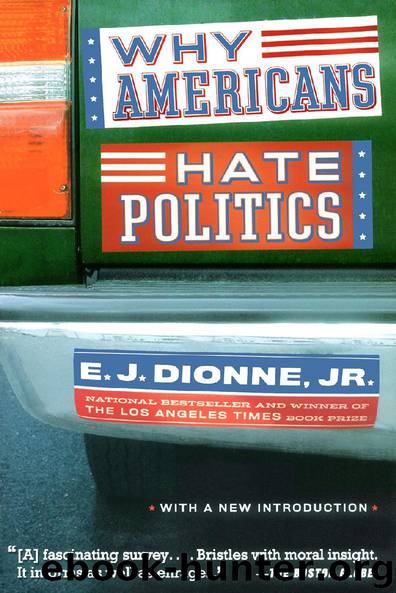Why Americans Hate Politics by E. J. Dionne Jr

Author:E. J. Dionne, Jr.
Language: eng
Format: epub
Publisher: Simon & Schuster
III
The relationship between the Religious Right and the sixties was thoroughly paradoxical. The Religious Right arose in reaction to “sixties permissiveness.” Yet the rise of the Religious Right and more generally, the growth of evangelical Christianity were also very much part of the revolt during the 1960s against the status quo—in the churches no less than in the broader society.
During the 1960s, much attention was lavished on the more exotic religious or quasi-religious movements that young people imported from abroad—Zen Buddhism, transcendental meditation, Hare Krishna, the teachings of the Swami Muktananda. But many among the young did not go abroad for new religions. Rather, they turned to new forms of homegrown Christianity, which in many cases turned out to be the old forms, which looked new only because mainline Christianity had become so resolutely modern.
Both Peter Clecak and Harvey Cox have argued that the resurgence of the old-time religion was part of the broader revolt against modernism and scientific rationality that can be traced to the countercultural and New Left movements of the 1960s. As Lutheran pastor Richard John Neuhaus put it, “the counterculturalists have served the moral majoritarians by whom they feel threatened.” Like the New Left, both the new religious movements and the new manifestations of old-time Christianity were skeptical of the bland pragmatism of the 1950s. Like the New Left, the new religious enthusiasts were suspicious of the ease with which the nation’s moral leaders, including those in the churches, had adapted themselves to the status quo. But if many on the New Left rejected religion—or never took it seriously in the first place—many among the new religious enthusiasts sought to transform the nation’s religious life, to reject “cheap grace” and turn religious faith into a challenge once again.
Even among those who turned to religion more for good vibes than for ethical guidance, there was a sense that the old modernist authorities had failed them. Leonard Sweet, an evangelical church historian, saw both the new religions and the new turn to the old ones as part of a “subjectivist search for authority” to replace forms of authority that were rejected during the 1960s. “People began to journey with anyone who promised them some new insight about the self or some escape from the burden of building a self,” he wrote. Both the Jesus movement (“Jesus people”) and the charismatic movement (with its emphasis on the inspirations of the Holy Spirit) were similar to new non-Christian movements of the 1960s, Sweet wrote, in that “both movements were obsessed with feeling and exhibited the strong desire to romp spiritually through new forms of consciousness and new dimensions of experience.”
The rebellion against mainstream religion, like the rebellion against liberal politics, developed both left and right tendencies. Like, many liberals in the political sphere, many religious liberals lost faith in the liberal religious project and in the assertions of the mainline churches. They became more radical, questioning whether the church or even God Himself, whom some pronounced “dead,” had anything at all to say to modernity.
Download
This site does not store any files on its server. We only index and link to content provided by other sites. Please contact the content providers to delete copyright contents if any and email us, we'll remove relevant links or contents immediately.
| Africa | Americas |
| Arctic & Antarctica | Asia |
| Australia & Oceania | Europe |
| Middle East | Russia |
| United States | World |
| Ancient Civilizations | Military |
| Historical Study & Educational Resources |
Cat's cradle by Kurt Vonnegut(15359)
Pimp by Iceberg Slim(14509)
4 3 2 1: A Novel by Paul Auster(12393)
Underground: A Human History of the Worlds Beneath Our Feet by Will Hunt(12099)
The Radium Girls by Kate Moore(12030)
Wiseguy by Nicholas Pileggi(5787)
The Fire Next Time by James Baldwin(5448)
Perfect Rhythm by Jae(5405)
American History Stories, Volume III (Yesterday's Classics) by Pratt Mara L(5308)
Paper Towns by Green John(5191)
Pale Blue Dot by Carl Sagan(5010)
A Higher Loyalty: Truth, Lies, and Leadership by James Comey(4964)
The Mayflower and the Pilgrims' New World by Nathaniel Philbrick(4504)
The Doomsday Machine by Daniel Ellsberg(4490)
Killers of the Flower Moon: The Osage Murders and the Birth of the FBI by David Grann(4448)
The Sympathizer by Viet Thanh Nguyen(4393)
Too Much and Not the Mood by Durga Chew-Bose(4348)
The Borden Murders by Sarah Miller(4325)
Sticky Fingers by Joe Hagan(4202)
